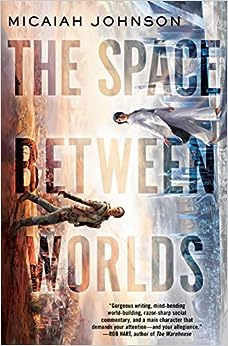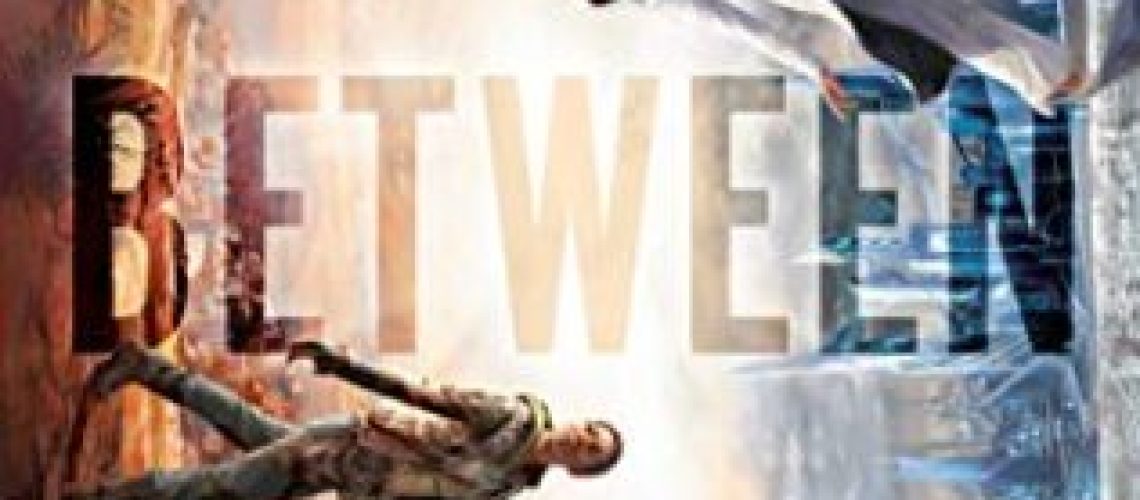The Space Between Worlds brings an unexpected post-apocalyptic setting, and a very personally focused narrative story as developments and extensions on the old SF trope of multiverse travel.

It’s a depleted world; society has broken down to the city-state level, but technology, society and people go on. In Wiley City, Adam Bosch has invented a way to get resources from other worlds, other universes where history has gone just a little differently. He can’t reach worlds that diverged radically from his own, just several hundred “close neighbors” in fact. But it’s enough to keep the city and environs supplied and functioning well. The trick is, to send someone into one of these multiverses and gather information, resources, or anything else, they can’t still be alive in the alternate world you send them to. To try and do so is fatal.
That’s where Cara comes in. She’s from the Rurals, the outskirts of Wiley City, and to say that she has had a hard life is an amazing understatement. Out of the 300-odd worlds where Adam’s machine can send someone, Cara is dead in all BUT eight. That makes her extremely valuable, more flexible than any of her counterparts. But when there are rumors that machines might be able to replace all of the humans, and one of Cara’s eight remaining counterparts dies, she is catapulted into a multiple universe plot grounded into the questions of who she is, and what she really wants.
This is the story of BIPOC author Micaiah Johnson’s debut novel, The Space Between Worlds.
I’ve been reading multiverse fiction since the days of Roger Zelazny’s Amber and Moorcock’s Eternal Champion novels. More science fictional treatments that I’ve particularly enjoyed range from Deborah Christian’s Mainline to Frederik Pohl’s The Coming of the Quantum Cats to Charles Stross’ Merchant Princes novels. So a new multiverse novel was bound to pique my interest from the get-go. As I delved into the book, I was surprised by what I found, in a good way, that this was not the multiverse book I was expecting. This is a strongly character-focused story, and is far less interested in the mechanics and philosophy of multiverse travel (although we get doses of that and in a new and interesting manner) than it is interested in Cara. Being a survivor, where most of her counterparts are not, means that Cara is quite aware of the knife-edged existence of society at large that the richer denizens of Wiley City (like, say, her inamorata Dell) don’t quite get. This means that when the central problems of the novel regarding her future — and also the world — open to her for the first time, the focus is on her, on her family, on her relationships and how those compare between various worlds. There are some thorny dynamics as Cara winds up entangled by multiple versions of a couple of characters, and her history and loyalty, and secrets come to the fore.
The overall feel of this post-apocalyptic world is something I want to mention, too. Multiverse travel into apocalypses and terrible worlds is pretty common — a good way to get resources, for one thing. Oil is still in the ground, after all. Sometimes, the only way to get your own copy of the Mona Lisa is to take it from a ruined Paris next door. But a world that has already had its apocalypse as your World Zero is something fresh and different. In addition, the easy course or the obvious option would be for World Zero to be pillaging worlds that had not gone through an apocalypse, Mad Max style. (The visuals and feels of Wiley City, Ashtown, the Rurals and beyond definitely have that Mad Max vibe) . But, no, all of the worlds that can be reached are close variations of this one, so it feels like the hardscrabble pillaging and stealing from the hardscrabble. As bad as World Zero can be for those not born of privilege, Johnson makes it clear that some of the other worlds are definitely worse — not only in leadership but in terms of plagues and even more elements of societal breakdown.There is definitely an Apocalypse World sort of veneer over proceedings.
Above and beyond that, the novel explores privilege, deprivation, and prejudice, from an economic and social bent. Wiley City’s reactions and relations with the world outside are interrogated and explored as are the relationships between different groups outside of the city. Even in the city itself, there is a vertical stratification — the higher up you live, the more well off you are, and there are definite tensions and social frictions that the author explores through Cara’s tight, first person narrative. This is a novel where multiple points of view would have diluted the power of the societal explorations and thinking we get here through Cara’s singular story. The writing and style immerse the reader into that singular story, and I was absorbed by the power of Johnson’s writing to bring me there.
Finally, The Space Between Worlds is a nicely self-contained story. Given its character focus and its focus on Cara’s arc, the novel comes to a single and complete conclusion, with no real hint or teasing about a sequel. We get a finished story here, and I left Cara and her world(s) satisfied with her narrative. You can pick this book up and put it down, done, and be satisfied in a way that in a world of series and trilogies seems more and more rare. Overall, The Space Between Worlds strongly impressed me. What can be done that is new in multiverse fiction that doesn’t feel like a retreat or an echo? Johnson’s character-focused, hardscrabble world shows that there are ways to revitalize the subgenre, and take it in new and interesting directions. With such a strong debut, I look forward to the next SFF work from this author.







